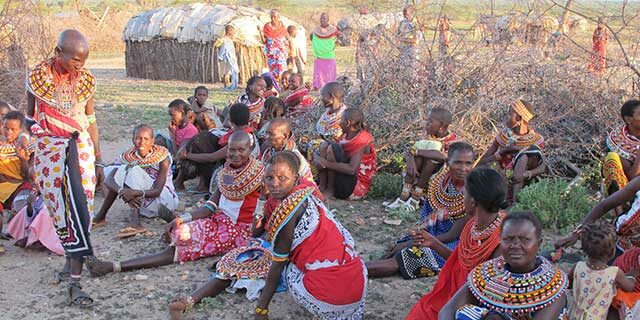The rate of Female Genital Mutilation (FGM) is 95% in Samburu and Maasai Mara counties.
When girls undergo FGM they’re subsequently considered “women” and many are forced to marry men who are older and sometimes polygamous or infected with HIV/AIDS.
The girls then live lives of servitude – building huts, gathering fire wood, fetching water in crocodile infested rivers, washing, cooking and raising children. Girls secretly suffer but don’t openly display opposition to their lives of hardship because they simply aren’t listened to or respected by authoritative men in the highly patriarchal community.
Girls who have dreams of being nurses, doctors, social workers, teachers and so forth lose hope in ever fulfilling their aspirations.
It’s very sad. Girls with so much intelligence and hope drown in their drudgery. Some girls make colorful beaded jewelry and souvenirs for the tourist industry. But that’s hardly fulfilling when life offers so much more.

Pastoralist Child Foundation’s founders, directors and facilitators are dedicated to accelerating the abandonment of FGM and child marriage. They’re very well respected, educated professionals and pioneers in educating their communities at the grassroots level. They have seen, first-hand, the suffering girls and women endure as a result of undergoing FGM and being forced to marry without a choice.
Through mobilization and education, Pastoralist Child Foundation replaces these harmful practices with safe Alternative Rites of Passage.
Pastoralist Child Foundation holds educational camps for young girls in Samburu County, in the local language, to raise awareness about the harmful effects of FGM, as well as other issues such as child marriage, teen pregnancy, and HIV/AIDS. The workshops are held in April, August and December. These months are commonly called “cutting season.”
The workshop facilitators are local doctors, nurses and social workers who are life-long Samburu residents who care deeply about the status of girls and women in their communities. They also dedicate their time and expertise year-round as volunteers and mentors for the girls.
The impact of the educational camps are far-reaching.
Girls make the commitment to share what they learn with their peers, relatives, and teachers.
The workshops are interactive where facilitators encourage girls to speak openly and honestly about their beliefs and practices.
This is a new concept for many girls because they’re members of a patriarchal society where their voices and opinions aren’t heard or respected.
On the last day of each camp we hold a celebratory graduation ceremony complete with songs, dance, theater and delicious food! Every girl receives a graduation certificate and a gift such as a Pastoralist Child Foundation T-shirt.
Guests include family and friends, local dignitaries, law enforcement representatives, teachers, and religious leaders.
In this way, the whole community is involved.
To date, PCF has directly saved 540 girls from FGM through our workshops – and many more who have been reached out to by the girls who attended the workshop. The girls return to their villages and share their notes with their peers, families, teachers, elders and anyone who is willing to learn. In December, 2015 Namayiana Village residents publicly declared their abandonment of FGM and stated that the decision was made after several girls attended PCF workshops.
We believe collective responsibility from all communities and stakeholders helps to decrease and, ultimately, end FGM. We educate the community at the grassroots level and see positive results following community discussions, door-to-door dialogues, and inter-generational dialogues that include youth, women, men, morans (Maasai), elders and circumcisers.
